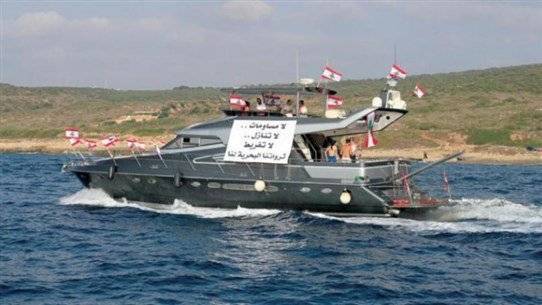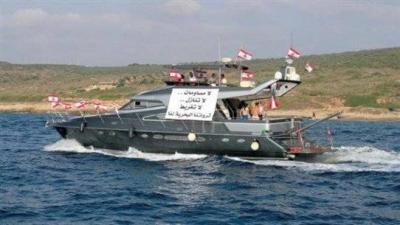The discussion about optimism regarding a potential agreement between Lebanon and Israel over maritime borders does not imply that Lebanon has entered the "oil-producing countries club," nor that its benefits from the expected gas in the sea are guaranteed or imminent. This is attributed to several political and technical reform-related reasons linked to the Lebanese reality and the ability of involved parties to take advantage of this wealth, should it be found after drilling begins. This view is shared by two experts consulted by "Asharq Al-Awsat": Dr. Sami Nader, Director of the "Middle East Institute for Strategic Affairs," and Lori Hatiyan, Director of the "Natural Resource Governance Institute in the Middle East and North Africa."
Nader points out that "the settlement agreement expected to be concluded based on the American offer received by Lebanon stipulates that the revenues from the disputed Qana field will be distributed between Lebanon and Israel." Nader aligns with Hatiyan in agreeing that there can be no talk of Lebanon benefiting from gas revenues in the absence of reforms and political stability.
Hatiyan states, "After the signing of the agreement, it is expected that Total will announce its action plan for Block 9 to explore the Qana field, according to the information received." She indicates that after the drilling process, which may last about two months as per the Petroleum Authority, the work period—which also includes evaluation and discovering the extension of the disputed Qana field between Lebanon and Israel—could stretch between one to one and a half years, bearing in mind that drilling in Block 4 lasted two months before they announced the absence of gas.
Regarding expectations from Block 9 in terms of gas presence and quantity, Nader confirms to "Asharq Al-Awsat" that "gas presence cannot be confirmed before the exploration and quantity determination processes. However, it is likely to contain gas since its existence has previously been established in fields closer to Israel and Cyprus." Hatiyan emphasizes that "the results from Block 4 are not related to what may be discovered in Block 9, as there are discovered fields containing a high percentage of gas, even though their area is considered small." Therefore, she underscores the importance of waiting to know what will be discovered after drilling begins and assessing the available quantity, whether Lebanon can benefit from its production.
While Lebanese officials rely on the economic implications of this issue for Lebanon in their statements, Hatiyan asserts that it is premature to discuss economic benefits for Lebanon from the gas if found and links this to several factors. She explains that "the political parties discussing benefits for Lebanon are doing so based solely on one concern, which is to alleviate external pressures and use this agreement as a negotiating tool with the International Monetary Fund and international bodies. However, for us as the Lebanese people, none of this is beneficial. What helps us are structural reformative measures, so even if gas is extracted, it won’t be of any use without implementing reforms in the presence of failed institutions and rampant corruption." She adds, "Experiences have proven that in countries similar to Lebanon, where governance is weak, institutions are failed and collapsed, and corruption is rampant, oil and gas do not save the country; rather they increase corruption, dictatorship, and poverty."
Nader also does not seem very optimistic about the possibility of benefiting from gas revenues if the Lebanese situation remains unchanged, saying, "Extracting oil is good, but the more important aspect is that gas funds are not used to feed waste and corruption. Reforms and good governance are essential conditions to transform these revenues into stability and prosperity for Lebanon, which may be difficult under the existing system." He also discusses "political and geopolitical stability," clarifying that "this region remains volatile, meaning that even if an agreement on gas sharing is achieved, it does not mean at all that there is a calming on the frontline of the ongoing conflict with Iran and between Israel and Iran and Hezbollah. Therefore, any flare-up for one reason or another could hinder the oil extraction process."
In addition to all these conditions, Hatiyan highlights a fundamental technical issue that affects the path toward benefiting from gas production: the infrastructure, which in turn is connected to the required reforms. She mentions, "The problem also lies in the lack of infrastructure and gas production stations, as there are only two small stations in Lebanon, which is expected to increase production costs and the cost of linking gas with Egypt or Cyprus, which also requires a political decision."
This week is expected to be decisive regarding the agreement between Lebanon and Israel following the presentation of a settlement offer from the American mediator for both parties, after negotiations had begun in 2020 and then paused in May 2021 due to disputes over the area in question. Initially, the talks were supposed to be limited to a maritime area estimated at about 860 square kilometers defined by Line 23, based on a map Lebanon submitted to the UN in 2011. However, Lebanon later claimed that the map relied on erroneous estimates and demanded discussions on an additional area of 1430 square kilometers that includes parts of the Karish field, known as Line 29. The Qana field is located in an area where Line 23 intersects with Line 1, the line that Israel submitted to the U.N. and extends beyond Line 23.




